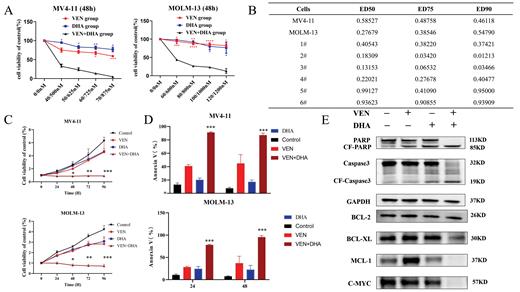Background: Venetoclax is a BH3 mimetic, which selectively inhibits Bcl-2. For older persons with newly diagnosed AML, the FDA has approved the use of venetoclax in conjunction with hypomethylating drugs or low-dose cytarabine. However, the selective inhibition of Bcl-2 in AML often results in the overexpression of Mcl-1, another dominant anti-apoptotic Bcl-2 family protein conferring venetoclax resistance. Dihydroartemisinin (DHA) is a herbal monomer that is taken orally to cure malaria. Studies have shown that DHA downregulates MCL-1 protein expression in AML cells. In the present study, we investigated whether the combination of venetoclax and DHA efficiently promotes apoptosis in AML cells.
Methods: We assessed the combined effect of venetoclax and DHA on cell viability, apoptosis, combination index, and cell cycle in AML cells from AML cell lines and deno AML patients. Western blot analysis was used to validate the mechanisms of venetoclax and DHA.
Results: Venetoclax efficiently impaired cell viability and dose-dependently promoted apoptosis when combined with DHA; their synergism was aptly represented by the combination index. Venetoclax and DHA had significant synergistic inhibition of cell viability both in cells from AML cell lines and in deno AML patients. The combination of venetoclax and DHA impaired cell cycle progression by arresting the cell cycle in S-phase and inducing apoptosis. Mechanistically, DHA mitigated venetoclax-induced upregulation of Mcl-1 and BCL-XL. Moreover, the combination inhibited the expression of C-MYC.
Conclusions: Our findings demonstrate the synergistic, preferential antileukemic effects of venetoclax and DHA on AML cells, providing a rationale for preclinical and clinical trials by combining these agents already being used in clinical practice to treat AML.
Disclosures
No relevant conflicts of interest to declare.


This feature is available to Subscribers Only
Sign In or Create an Account Close Modal